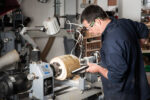 Safety glasses are useful for work or recreational activities. Safety glasses are designed to protect the eyes from chemicals during cleaning or from debris during working.
Safety glasses are useful for work or recreational activities. Safety glasses are designed to protect the eyes from chemicals during cleaning or from debris during working.
Good safety glasses can be pricey which is why many people try to buy well-made ones that can be used over and over again.
But you may wonder if it’s actually safe and effective to reuse safety glasses?
Read on for more information on when you can reuse safety glasses and when you should discard them and purchase a new pair.
Consider the type of glasses you’re using
The type of glasses you have can determine whether they should be reused. The condition of the glasses after use will also determine how many times you can reuse the glasses. Consider the following information on basic types of safety glasses.
1.) Prescription safety glasses – These are designed for those who need prescription glasses daily for reading, working, and other uses. These glasses tend to be made well because they are usually pricier than other safety glasses, which means they can be reused as long as they maintain their integrity.
2.) Shooting glasses – These types of lightweight safety glasses are made to wear during shooting competitions, target practice, or while hunting. These glasses can also be worn multiple times as long as they aren’t cracked, broken, or worn from excessive use.
3.) Safety sunglasses – These safety glasses provide your eyes with sun protection for mowing lawns or other outdoor work. These can also be reused multiple times.
4.) Safety goggles – Safety goggles are designed to go completely around the eyes to offer protection from liquids and hazardous materials that may splash or leak. In certain conditions, these glasses may not be designed for reuse.
If they come into contact with harmful materials, the manufacturer may recommend discarding them. You may also have the option to clean them for reuse depending on the manufacturer’s instructions.
5.) OSHA/ANSI-approved glasses– This distinction is important when you work in certain types of industries that require specific safety gear. OSHA/ANSI approved glasses come in various styles so the ability to reuse them can vary from case to case.
Most glasses can be used many times
In general, you can reuse most types of safety glasses. This is very helpful for many people because once you find a pair of safety glasses that fits well and provides the exact protection you need, you don’t want to have to switch out those glasses unless it’s absolutely necessary.
If you’re concerned about the particular recommendations for the glasses you wear, it’s helpful to read the instructions included with the glasses. Most manufacturers will include helpful information on reusing safety glasses.
They may also give information on how to clean your safety glasses to keep them in good working order so you can wear them as needed. Certain working environments may also have recommendations or restrictions about when it’s ok to reuse glasses and when you should discard them.
When you shouldn’t reuse safety glasses
There are times when safety glasses shouldn’t be reused. When safety glasses are used multiple times, they began to become looser on the face which makes them not safe for use.
It’s always a good idea to try on your safety glasses before you begin working with hazardous materials to be sure they are going to stay in place to provide your eyes with maximum protection.
The glasses should stay in place as you move your head around in ways that are normal for the type of work you’re doing. Safety glasses shouldn’t be reused when they have been damaged in any way.
If the glasses lose their integrity from being overused, broken, warped, or damaged, they are no longer useful when it comes to protecting your eyes.
Safety glasses that are scratched are also not safe for reuse as this can prevent you from being able to see what you’re doing. When working with hazardous liquids like chemicals or bio-waste in a lab setting, you may need to dispose of your safety glasses after each use.
Companies and organizations may have specific instructions on what to do with your safety glasses after use which can help you better understand when they should not be reused.
Pros of reusing safety glasses
-
-
- Reusing safety glasses can save a lot of money over time, especially if you use the pricier styles of glasses.
- Being able to reuse your glasses means less waste.
- Once you find a well-fitting pair of safety glasses, being able to reuse them saves time and effort since you don’t have to try new styles or brands to find one that works well.
-
Cons of reusing safety glasses
-
-
- Glasses can get warped or misshapen over time when reused, which makes them uncomfortable and can actually reduce their ability to protect your eyes.
- Safety glasses can get dirty and need frequent cleaning, especially if you work outdoors or in other jobs where you encounter dirt and other debris.
- If you work in a hot environment, your safety glasses can get sweaty and require cleaning, an inconvenience when it would be easier to throw them away and use a new pair.
- One of the most difficult things about reusing safety glasses is ensuring that you don’t lose them when you’re not wearing them.
-
Is it safe to share/reuse safety glasses with others?
In some situations, safety equipment may be shared among many people. In most cases, it is safe to share and reuse safety glasses with others as long as the glasses are cleaned and sanitized between uses.
The proper protocol for this can vary between companies or organizations. It’s always best to err on the side of caution when sharing safety glasses and reusing them after others have worn them in order to prevent the spread of pathogens between users.
A good pair of safety glasses should be constructed well and made of durable materials. This means they can usually be used many times. Safety glasses are designed to protect the eyes from objects, chemicals, or debris.
They can be reused in most circumstances, but it’s always important to check your safety glasses before each use to ensure they’re still in good working order, without cracks, scratches, or other defects that might affect their ability to protect your eyes.







